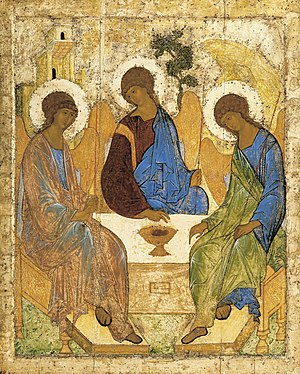XIII SUNDAY IN ORDINARY TIME - Galatians 5:1,13-18
There is a universal struggle which reverberates through all cultures and all civilisations - the struggle between good and evil, light and darkness, life and death. This is a very old theme, which has been a subject of discussion throughout the ages because human history is pervaded by this struggle. At all times, humanity has been presented with choices that may lead us in completely different paths. Whenever we recognise the others, respect their rights and accept their freedom, we walk on the road which leads to a peaceful society; or we may choose a different path, the one in which we oppress and exploit the others. There are times, when we are ready to make war on others, sowing destruction and death in order to affirm ourselves and to lord over them.
In his letter to the Galatians, Paul speaks of an internal struggle, happening in our hearts - a struggle between self-indulgence (the flesh) and the spirit. If we allow ourselves to be guided by the Spirit, then we will live by the Spirit and our actions will be guided by the only commandment that is according to the Spirit: “Love your neighbour as yourself.”
Paul's words sound very timely as if they were written for the modern man, who seeks to affirm human rights at all costs, being preoccupied with the exercise of freedom. In this affirmation of human rights and of freedom, our modern western society forgets that they are embedded in Judaeo-Christian tradition, which claims that our common human dignity comes from being created in God’s image. Paul gave a step forward, affirming that we are not slaves, but children of God (Ro 8:15-17). There is no reason for discrimination of any kind since all of us are one in Christ (Gal 3:28). We have been set free by Christ and therefore we are "called to freedom." However, while we are aware of the importance of social and political freedom, inner freedom of heart is the most fundamental. Without it, freedom becomes self-indulgence, and, under the pretext of freedom, we may become slaves to the vilest passions, which destroy us. Thus, the affirmation of "my" rights without any concern for "my" responsibilities leads to selfishness and hedonism that end up corrupting and destroying society. We must allow ourselves to be led by the Spirit who makes it possible for us to “serve one another in works of love”. Indeed, Paul presents the law of love, also known as the golden rule, as the norm of all morality: "Love your neighbour as yourself”. If we ignore it and allow ourselves to be guided by the desires of the flesh, that is, by worldly values and instincts, we end up oppressing and exploiting others. If we let ourselves be led by the Spirit, we will be truly free and allow others to exercise their freedom.
In his letter to the Galatians, Paul speaks of an internal struggle, happening in our hearts - a struggle between self-indulgence (the flesh) and the spirit. If we allow ourselves to be guided by the Spirit, then we will live by the Spirit and our actions will be guided by the only commandment that is according to the Spirit: “Love your neighbour as yourself.”
Paul's words sound very timely as if they were written for the modern man, who seeks to affirm human rights at all costs, being preoccupied with the exercise of freedom. In this affirmation of human rights and of freedom, our modern western society forgets that they are embedded in Judaeo-Christian tradition, which claims that our common human dignity comes from being created in God’s image. Paul gave a step forward, affirming that we are not slaves, but children of God (Ro 8:15-17). There is no reason for discrimination of any kind since all of us are one in Christ (Gal 3:28). We have been set free by Christ and therefore we are "called to freedom." However, while we are aware of the importance of social and political freedom, inner freedom of heart is the most fundamental. Without it, freedom becomes self-indulgence, and, under the pretext of freedom, we may become slaves to the vilest passions, which destroy us. Thus, the affirmation of "my" rights without any concern for "my" responsibilities leads to selfishness and hedonism that end up corrupting and destroying society. We must allow ourselves to be led by the Spirit who makes it possible for us to “serve one another in works of love”. Indeed, Paul presents the law of love, also known as the golden rule, as the norm of all morality: "Love your neighbour as yourself”. If we ignore it and allow ourselves to be guided by the desires of the flesh, that is, by worldly values and instincts, we end up oppressing and exploiting others. If we let ourselves be led by the Spirit, we will be truly free and allow others to exercise their freedom.



